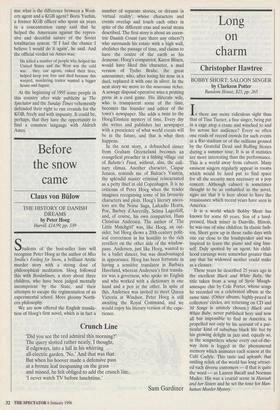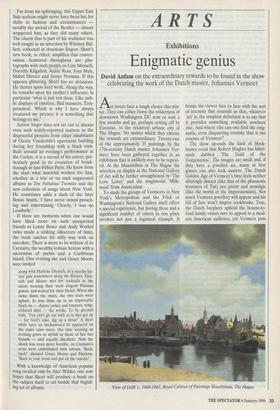Long on charm
Christopher Hawtree
BOBBY SHORT: SALOON SINGER by Clarkson Potter Random House, $25, pp. 265 I s there any more ridiculous sight than that of Tina Turner, a fine singer, being put in a cage atop a crane and winched to and fro across her audience? Every so often one reads of record crowds for such events in a Rio stadium or of the millions grossed by the Grateful Dead and Rolling Stones during a summer tour. It is as if statistics are more interesting than the performance. This is a world away from cabaret. Many eminent singers regularly appear in rooms which would be hard put to find space for all the security men necessary at a pop concert. Although cabaret is sometimes thought to be as embattled as the novel, signs are that it is here about to have the renaissance which recent years have seen in America.
It is a world which Bobby Short has known for some 60 years. Son of a hard- pressed, black miner in Danville, Illinois, he was one of nine children. In classic fash- ion, Short grew up in those radio days with one ear close to the loudspeaker and was inspired to learn the piano and sing him- self. Duly spotted by an agent, his child- hood earnings were somewhat greater than any that his widowed mother could make as a cleaner.
These years he described 25 years ago in the excellent Black and White Baby, the title taken from a song of Syrie Maugh- amesque chic by Cole Porter, whose songs he recorded on a celebrated album at the same time. (Other albums, highly-priced in collectors' circles, are returning on CD and 50 Songs is astutely chosen.) Black and White Baby, never published here and now all but impossible to find in America, is propelled not only by his account of a par- ticular kind of suburban black life but by his growing delight in jazz and, equally so, in the songwriters whose every out-of-the- way item is logged in the phenomenal memory which animates each season at the Café Carlyle. This taste and aplomb, that smiling relish of the world has long attract- ed such diverse customers — if that is quite the word — as Lauren Bacall and Norman Mailer. His was a crucial scene in Hannah and her Sisters and he set the tone for Man- hattan Murder Mystery. Far from his upbringing, this Upper East Side acclaim might never have been his, for shifts in fashion and circumstances notably the arrival of the Beatles — almost scuppered him, as they did many others. The charm that is part of his resilience was well caught in an interview by Whitney Bal- liett, collected in American Singers. Short's new book, in effect, amplifies that conver- sation. Scattered throughout are pho- tographs with such people as Liza Minnelli, Dorothy Kilgallen, Annie Ross, Jean Muir, Mabel Mercer and Jessye Norman. If this appears glittering, Short has no delusions. He thrives upon hard work. Along the way, he remarks upon his mother's influence, in particular 'what is just not done. Like pub- lic displays of emotion. Bad manners. Tem- perament. Which is why I have always treasured my privacy; it is something that belongs to me.'
Saloon Singer does not set out to discuss even such widely-reported matters as the disgraceful protests from other inhabitants of Gloria Vanderbilt's apartment building during her friendship with a black man. Built around an evening's performance at the Carlyle, it is a record of his career, par- ticularly good in its evocation of break- through in late-Fifties Paris. He knew from the start what material worked for him, whether as a trio or on such augmented albums as Ten Fabulous Twenties and the new collection of songs about New York. He sometimes adds a dash of the later Bessie Smith, 'I have never mixed preach- ing and entertaining. Clearly, I was no Leadbelly.'
If there are moments when one would have liked more on such unexpected friends as Lenny Bruce and Andy Warhol (who made a striking silkscreen of him), the book catches his nifty way with an anecdote. There is more to be written of Jo Carstairs, the wealthy lesbian heiress with a succession of yachts and a Caribbean island. One evening she and Grace Moore were invited
along with Marlene Dietrich, to a starchy for- mal gala somewhere along the Riviera. Diet- rich and Moore met for cocktails in the salon, wearing their most elegant Parisian gowns, and waited for their friend. When she came down the stairs, the two stars were aghast. Jo was done up in an impeccable black tie — dinner jacket and trousers, wing- collared shirt — the works. To be greeted with, 'You can't go out with us in that get up — for God's sake, dig up a dress!' A short while later an unchastened Jo appeared on the stairs once more, this time wearing an evening gown as stylish as those of her two friends — and equally décolleté. Now the shock was even more horrific. Jo Carstairs's arms were embellished with tattoos. 'Back, back!' shouted Grace Moore and Marlene. `Back to your room and put on the tuxedo!'
With a knowledge of American popular song rivalled only by Alec Wilder, one now hopes that Short will produce a book on the subject itself to set beside that beguil- ing set of albums.



















































 Previous page
Previous page